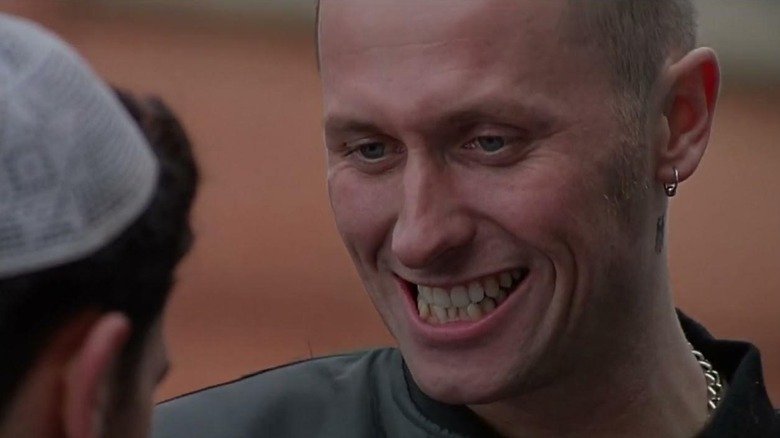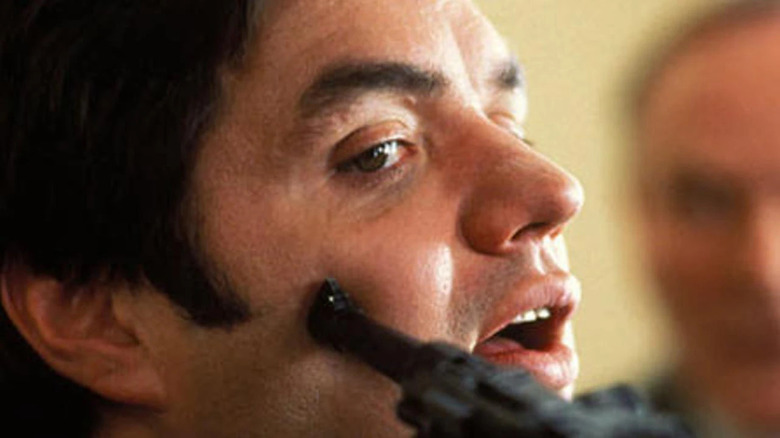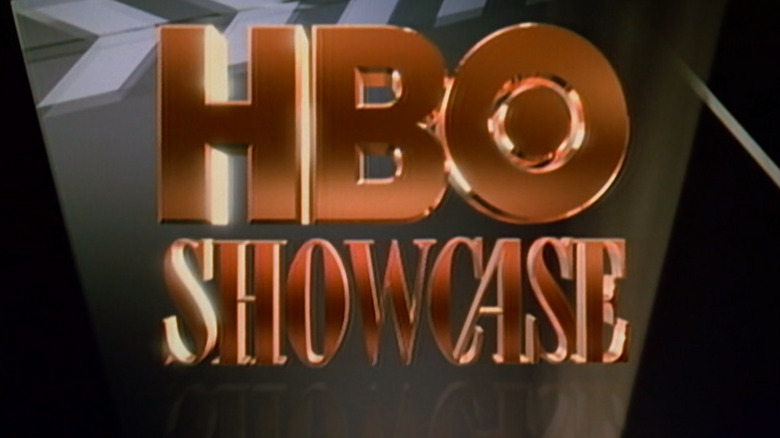A Terrifying 1995 Thriller Based On A True Story Marked The End Of An Era For HBO
When HBO first launched way back in 1972, it wasn't seen as a very big deal. Pay cable TV networks were still uncommon at the time, and they weren't very profitable. The idea behind pay-TV is common now — pay a subscription fee for access to high-end sporting events and uncensored, ad-free Hollywood movies — but at the time, it was seen as an extravagance. It certainly didn't help that movie theater owners and major TV networks heavily campaigned against networks like HBO, which they saw as a minor threat.
HBO used modern tech to innovate, however — they were one of the earlier networks to make use of geostationary satellites — and their influence began to grow. In 1975, they broadcasted their fist exclusive standup special (featuring Robert Klein), leading to a cottage industry of standup comedy broadcasts (which lasts to this day). This increased the profile of the HBO brand by leaps and bounds. It wouldn't be until 1982 that HBO Films would come into being. That was also the year HBO started offering broadcasting 24/7, which was novel at a time when networks went off the air for the night.
The first original HBO movie the network ever broadcast was the prestige weepie "The Terry Fox Story," a downbeat biopic about the famed Canadian runner who had to have a leg amputated due to cancer. "The Terry Fox Story" played in theaters in England and in Canada, but it holds the record of being the very first TV movie made exclusively for a cable TV network. The film isn't terribly well-remembered today, but it was groundbreaking at the time.
After "Fox," HBO leaned hard into production, releasing or at least co-distributing multiple feature films every year. In 1986, the studio became HBO Showcase, a company that, in its nine years of existence, oversaw dozens and dozens of movies. HBO Showcase didn't draw to a close until 1995, when the company underwent some restructuring. The final film put out by HBO Showcase was "The Infiltrator," a Neo-Nazi cop biopic starring Oliver Platt.
The Infiltrator was the last film distributed by HBO Showcase
HBO Showcase was likely a brand you saw in theaters, had you been attending movies in the late 1980s and early 1990s. Showcase co-distributed several major studio pictures like David Lean's "A Passage to India," the Tom Hanks comedy "Volunteers," the horror flick "The Hitcher," the hot comedy "¡Three Amigos!," and, a little bit later, "Switch," "Richochet," and "Don't Tell Mom the Babysitter's Dead." Some of their TV movies were highly acclaimed, although most came and went without much fanfare. What HBO Showcase proved, though, was that a cable TV network could become a power player in Hollywood. We recently saw a re-up of this same notion with streaming services in the late 2010s and early 2020s.
"The Infiltrator" isn't very well-remembered today, other than as the final HBO Showcase movie. Directed by Scottish director John Mackenzie, "The Infiltrator" told the true story of Yarov Svoray (Platt), an Israeli journalist who traveled to Germany in the early '90s to investigate the unsettling rise of a Neo-Nazi movement in Germany. During his investigation, Svoray is arrested during a scrape with a skinhead gang ... leading the police to believe he is one of them. Svoray takes the opportunity to infiltrate the gang, pretending to be a Neo-Nazi in order to get the skinny on their activities and horrifying ethos. The film also starred notable actors like Arliss Howard, Julian Glover, Alan King, and Peter Riegart.
By all accounts, the real-life story is more interesting than the movie itself. Platt, a very talented actor, isn't well-suited to a hefty, downbeat role like this, and even a brief glimpse at the film reveals that he was miscast. "The Infiltrator" didn't kill HBO Showcase by any means, but it was an inauspicious exit for the brand.
HBO Showcase re-branded in 1996
It's worth remembering that, after HBO's mushrooming in the 1980s, Time-Warner stepped in to purchase the company in 1989. The influx of studio clout helped the already-large brand become that much larger. Also, HBO began producing their own TV shows as well in the late '80s, most of them infused with sex, gore, and cussing, things that networks couldn't do; there's a reason why multiple episodes of "Tales from the Crypt" featured topless scenes. HBO was also switching to digital broadcast signals, retaining their tradition of sticking with cutting-edge tech to bring their content to viewers.
HBO rebranded their Showcase line as HBO NYC, debuting with the TV movie "Deadly Voyage," a ship-bound mystery also directed by John Mackenzie. From 1996 to 1999, HBO NYC oversaw all the in-house movies, some high-profile ("Gotti," "Gia," "If These Walls Could Talk"), most forgotten. Steven Spielberg's 1997 prestige picture "Amistad" was co-handled by the NYC brand.
But then HBO NYC folded in 1999 and was re-launched in 2000 as HBO Films. The final film to show under the HBO NYC line was "Witness Protection" starring the late Tom Sizemore. The first HBO Films movie was "Dancing in September," a film I'm certain you didn't watch. In 2002, HBO Films had its first great theatrical success with "My Big Fat Greek Wedding," co-distributed by IFC, and which made over $367 million on a $5 million budget.
Know, then, that HBO constantly launching sub-brands and re-brands is not a recent phenomenon. Of course, these days the company is known for having cycled through HBO Take 2, HBO Family, HBO on Demand, HBO HD, HBO Go, HBO Now, HBO Max, just Max, and then HBO Max again. Of course, growing up in the '80s, one might remember when HBO was merely a venue to see mid-budget studio fare that wasn't terribly well-regarded in theaters. A standup comedian once pbserved that "HBO" doesn't stand for "Home Box Office," but "Hey! 'Beastmaster's' On!"


